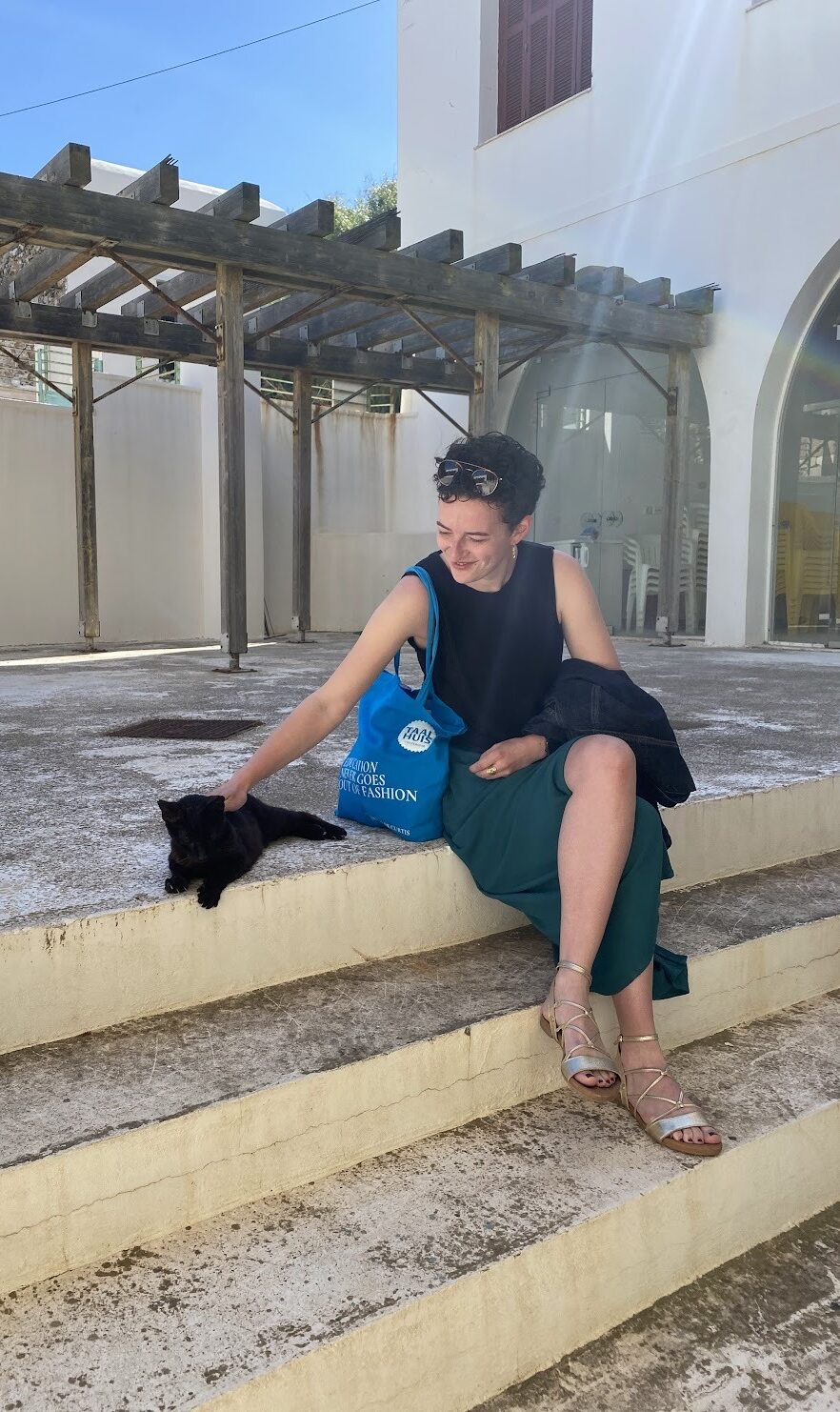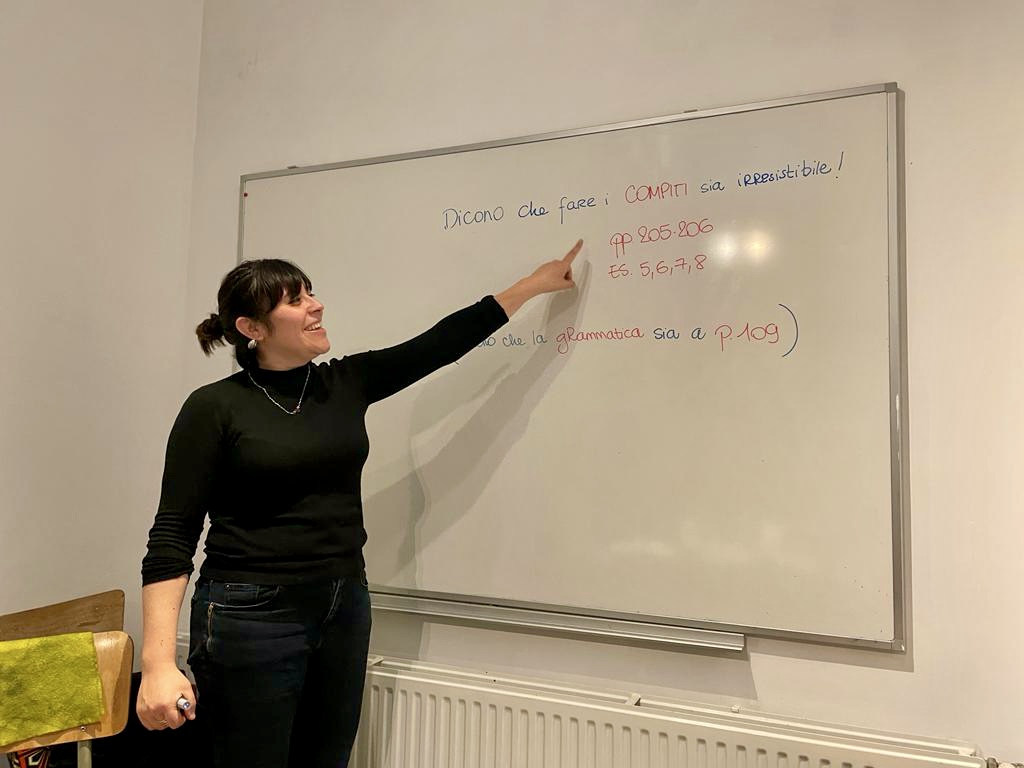A sentence with an error is better than no sentence at all
An interview with Lieke Rademakers about teaching, linguistics and her love for dialects.
Lieke! Where are you from?
I am from Brabant. My family is from Limburg and Limburgish is one of my mother tongues. No one in my area spoke Limburgish, but at home we did. I really had a “home language” and an “outside language”. This sometimes caused funny mix-ups. For instance, in kindergarten I wasn’t sure whether the word ‘beige’ existed only in Limburgish or also in Dutch. I could be quite insecure about things like that. That regional variation is something that I find very interesting. And students find it interesting too, I notice.
How did you end up at Taalhuis?
After studying classical languages and German, I did a master’s degree in literary studies. When I had just completed that, I heard about a vacancy for a Latin teacher at Taalhuis through Elianne, who is a Dutch teacher and a friend from my studies of classical languages. I started teaching a Latin course, and then quickly moved into teaching Dutch. Now, I am also one of the Dutch coordinators. I create the course schedules, do all kinds of office tasks within the organisation, and also occasionally moderate lectures on special languages.
Do your studies in German and classical languages benefit you when teaching Dutch?
When you study another language, you also learn a lot about your own language. Especially with the classical languages, which are quite linguistically complex, and you can’t ask a native speaker how they work exactly. I have always loved grammar, historical linguistics and language variation and change. My passion really lies in linguistics. So, I really enjoy learning things about my own language, and I can use that in my teaching.
Grammar.. that’s not everyone’s strong suit.
I always find that a fun challenge. The trick is to convey it to students in chunks that are suitable for their particular level. If someone at A1 level wants to know whether you should use “de” or “het” in Dutch, your answer will be different than if someone at B2 level asks the same question. Then maybe you can go into more detail.
Which courses do you teach?
I teach Dutch for all levels up to C1. I grow together with my students. Over the past year and a half, I have taught a lot of B2 level courses. I find that super fun. People who learn Dutch at that level are often the ones who really want to master the language. They not only want to be able to have everyday conversations, but they also want to be able to function in Dutch at work, want to become a Dutch citizen or already are, and would like to be able to express themselves more precisely and nuanced. Furthermore, I also often teach the Fast Tracks for German speakers, where of course my studies come in handy.
What do you like most about teaching at Taalhuis?
You really have a special relationship with students. They put themselves in your hands to learn something new. That’s quite a vulnerable thing. One really has to try, make mistakes, and then be corrected. Not because it is bad to make mistakes, but precisely because it makes one better. That is why there must be trust in the lessons.
Many students first think ‘I can’t do this, I don’t know what to do with this’. Then, gradually, they notice that it starts to work, and that they can do something that they could not do yesterday. I like that moment of success, and that people leave the classroom with a good feeling. They notice that they have learned something that they can immediately use at home or on the street or in a store.
What have you learned by teaching at Taalhuis?
I learned a lot about Dutch itself. Have you ever thought about all the ways you can use the word ‘er’ in Dutch? And also other rules of the language: things like word order that, as a native speaker, you do by instinct, without knowing exactly why. What I like most is when a student asks a question that I don’t know the answer to, that sparks my curiosity. Then I’ll research it so that I can explain it.
Some people find it scary to start learning a new language. Do you have a good trick to break the ice?
Not a specific icebreaker, but I always do an activity in the first lesson to ensure that everyone gets to know each other well. I invest a lot of time in that. This is possible at all levels. It is important to create a good atmosphere from the start. I joke around and try to be a little relatable. And I’m also realistic. That can actually be comforting.
“It is hard what we are doing right now, so don’t worry about it, we are doing it in small steps. We are learning this part first, if you can do that: well done, next step.”
Do you ever encounter misunderstandings about the Dutch language, or about learning Dutch?
Some people think that Dutch is a very difficult language to learn. I don’t agree with that, or at least it is not necessarily more difficult than other languages. There are certainly difficult things in Dutch. I just mentioned the use of ‘er’. That is typically one of those words that everyone stumbles over.
The pronunciation of Dutch is also often seen as ‘difficult’. But the ‘g’ sound is also present in German and Arabic, for example. And there are more languages that have similarities with Dutch. So it mainly depends on what you are familiar with.
Which language would you like to learn to speak?
I am learning Arabic and Greek. Someday, I would like to achieve at least A1 level in all languages offered at Taalhuis. I think the next new language I start will be Turkish. But first I want to improve my Arabic and Greek.
Is there a student who has stood out to you over the past four years?
There are several. I like it when people go the extra mile. I once had a student who does stand-up comedy in Dutch, and he often shared his jokes with me and with the class. I always found that really cool and special. And I also received some very nice writing assignments. Sometimes someone writes something that not only fulfills the assignment, but becomes a really creative or personal piece about what someone has learned. And a former student, Gordon, is a musician, and in class, he always told us about the new songs he had written that week. One time after class, he sent me a song about our course, with very sweet and warm lyrics, which really made me quite emotional. But it was in English, so I challenged him to write a Dutch song, too. He was a bit nervous, but it was in my inbox a few days later anyway.
Another example: in one of my courses, the students take turns giving presentations about one of the Dutch provinces. The students really ran with that assignment. I find it special to see that when one person puts time and effort into it, the other students listen with interest and they all have questions. “Can you read us that Limburgish sentence?” After their classmate’s presentation, a couple of them went on an excursion to Den Bosch to see whether the traditional sausage rolls and “Bossche bollen” were indeed worth it. I think it’s cool that they inspire each other to further explore this country.
This way I can also pay attention to the variations in Dutch. And show that there is more than what is happening in the Randstad area. Not only in terms of culture and nature, but also in terms of language.
Do you have a tip that you always give to students, for example at the end of the course?
Learning a language is above all: just doing it. Make mistakes. I myself find that very difficult. I hate the feeling of wanting to say something and not being one hundred percent sure that what you’re saying is ‘right’. I am a perfectionist, so I understand that many people have to cross that threshold. But the only way to learn it is to do it regardless. And it is better to say a sentence with an error in it than to say nothing at all.


